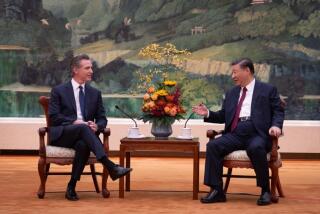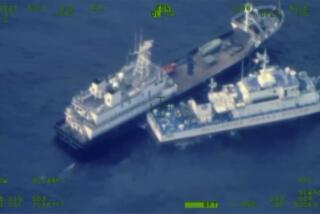Despite Possibility of Coup, Aquino Leaves for 3-Day China Visit
- Share via
MANILA — With thousands of government troops braced for the possibility of an attempted coup, President Corazon Aquino left the Philippines today for a three-day state visit to China, marking the first time in 18 months that she has turned over the helm of government to someone else.
Aquino, who has survived five military coup attempts in two years and an escalating Communist insurgency, assured the nation Wednesday that her rule remains strong and stable, despite the recent escape from military custody of former Philippine army Col. Gregorio (Gringo) Honasan, who led the most serious of those uprisings last August.
But on the eve of her departure for Beijing, the president also announced that she was leaving her government under the control of her loyal military commanders and advisers--not in the hands of other elected officials.
The armed forces were placed on nationwide alert Wednesday as an additional 2,000 anti-terrorist troops were deployed at key government installations in Manila. Describing the precautions, a banner headline in one Manila newspaper declared, “War Footing.”
Aquino’s press secretary, Teodoro Benigno, has said repeatedly that any armed move against Aquino’s government, even in her absence, will fail.
On Tuesday, Benigno announced the results of an opinion poll that he said bolstered the president’s position. The independent study showed that Aquino enjoys record popularity--77% of the 2,000 Filipinos surveyed nationwide, he said. Two-thirds also approved of Aquino’s using emergency powers to give the armed forces expanded authority to arrest, detain and interrogate, he added.
After a security meeting between Aquino and her top military commanders Tuesday, the military chief of staff, Gen. Renato de Villa, also assured the nation that the overwhelming majority of the military remains loyal. The military, he said, “is prepared for any contingency that may develop in connection with the departure of the president.”
Nonetheless, the prolonged debate about whether Aquino should take her scheduled trip to China, where she plans to discover her family’s ancestral roots and discuss key trade issues with Chinese Premier Li Peng, has served as a platform for analysts, critics and supporters alike to assess the state of her government.
And Honasan, who escaped April 2 from a Philippine navy prison ship, has deliberately fueled that debate. Within days of fleeing with 13 of his elite guards, he again began issuing statements threatening to use force against the Aquino government.
The propaganda campaign is similar to the war of words that Honasan waged against Aquino after he fled into hiding at the height of his Aug. 28 coup attempt, which left at least 53 dead and hundreds wounded.
Defense Secretary Fidel V. Ramos, who as armed forces chief crushed Honasan’s attempted takeover, declared at a Philippine Senate hearing this week that “she should go” to China. He cautioned that “we must not relax our vigilance,” but added, “These escapes, while worrisome and bothersome, are not so big or so threatening that they would serve to cancel the visit of the president to a neighboring country.”
Sen. Ernesto Maceda is also among those who have backed Aquino’s decision to go ahead. To cancel, Maceda said, would be both an insult to the Chinese and a tacit admission that the government remains unstable. On Tuesday, though, even Maceda urged Aquino to cancel her other planned trips to Europe, possibly including Moscow, later this year.
“Let’s avoid the recurring debate every time she leaves,” Maceda said. “The insurgency situation is very serious. It is the better part of discretion for her not to plan any more trips.”
Meanwhile, other national leaders continued to press for a last-minute cancellation of the current trip. Sen. Juan Ponce Enrile, the opposition leader whom Aquino fired as her defense minister in November, 1986, amid rumors that he was plotting a coup, has publicly advised Aquino against going to China.
“If I were in her place, I would rethink my position, given the problems of the country,” said Enrile, who is Honasan’s former boss and personal mentor.
Aquino and her aides have angrily rebutted Enrile’s assessment and instead have taken pains to cast the China trip as an important opportunity for the Philippines to improve its relations with one of Asia’s principal powers.
At the same time, they argue, it can augment trade between the two countries, build personal relationships between Aquino and China’s leaders--and serve as a symbol that Aquino’s government is now “coup proof.” The trip will be Aquino’s first absence from the Philippines since a September, 1986, visit to the United States.
For Aquino, there is also a strong personal dimension to the visit. It is her first trip to the birthplace of her great-great-grandfather, the small village of Hongjiang in Fujian province, and the Chinese have gone to great lengths to prepare for the Philippine leader.
Although the country’s Communist insurgency remains the biggest threat to Aquino, Western military analysts and Communist Party leaders conceded that this week is perhaps the best time for the president to be absent.
The military has scored several important victories against the insurgents in recent weeks, and rebel leaders concede that, in the short term, they are in no position to stage bold attacks in the nation’s capital.
More to Read
Sign up for Essential California
The most important California stories and recommendations in your inbox every morning.
You may occasionally receive promotional content from the Los Angeles Times.













